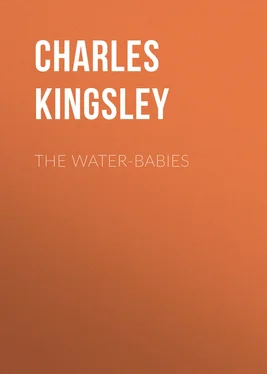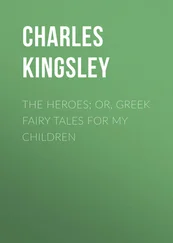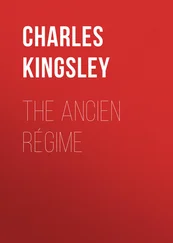Charles Kingsley - The Water-Babies
Здесь есть возможность читать онлайн «Charles Kingsley - The Water-Babies» — ознакомительный отрывок электронной книги совершенно бесплатно, а после прочтения отрывка купить полную версию. В некоторых случаях можно слушать аудио, скачать через торрент в формате fb2 и присутствует краткое содержание. Жанр: Сказка, foreign_antique, foreign_prose, foreign_children, на английском языке. Описание произведения, (предисловие) а так же отзывы посетителей доступны на портале библиотеки ЛибКат.
- Название:The Water-Babies
- Автор:
- Жанр:
- Год:неизвестен
- ISBN:нет данных
- Рейтинг книги:5 / 5. Голосов: 1
-
Избранное:Добавить в избранное
- Отзывы:
-
Ваша оценка:
- 100
- 1
- 2
- 3
- 4
- 5
The Water-Babies: краткое содержание, описание и аннотация
Предлагаем к чтению аннотацию, описание, краткое содержание или предисловие (зависит от того, что написал сам автор книги «The Water-Babies»). Если вы не нашли необходимую информацию о книге — напишите в комментариях, мы постараемся отыскать её.
The Water-Babies — читать онлайн ознакомительный отрывок
Ниже представлен текст книги, разбитый по страницам. Система сохранения места последней прочитанной страницы, позволяет с удобством читать онлайн бесплатно книгу «The Water-Babies», без необходимости каждый раз заново искать на чём Вы остановились. Поставьте закладку, и сможете в любой момент перейти на страницу, на которой закончили чтение.
Интервал:
Закладка:
“But surely if there were water-babies, somebody would have caught one at least?”
Well. How do you know that somebody has not?
“But they would have put it into spirits, or into the Illustrated News , or perhaps cut it into two halves, poor dear little thing, and sent one to Professor Owen, and one to Professor Huxley, to see what they would each say about it.”
Ah, my dear little man! that does not follow at all, as you will see before the end of the story.
“But a water-baby is contrary to nature.”
Well, but, my dear little man, you must learn to talk about such things, when you grow older, in a very different way from that. You must not talk about “ain’t” and “can’t” when you speak of this great wonderful world round you, of which the wisest man knows only the very smallest corner, and is, as the great Sir Isaac Newton said, only a child picking up pebbles on the shore of a boundless ocean.
You must not say that this cannot be, or that that is contrary to nature. You do not know what Nature is, or what she can do; and nobody knows; not even Sir Roderick Murchison, or Professor Owen, or Professor Sedgwick, or Professor Huxley, or Mr. Darwin, or Professor Faraday, or Mr. Grove, or any other of the great men whom good boys are taught to respect. They are very wise men; and you must listen respectfully to all they say: but even if they should say, which I am sure they never would, “That cannot exist. That is contrary to nature,” you must wait a little, and see; for perhaps even they may be wrong. It is only children who read Aunt Agitate’s Arguments, or Cousin Cramchild’s Conversations; or lads who go to popular lectures, and see a man pointing at a few big ugly pictures on the wall, or making nasty smells with bottles and squirts, for an hour or two, and calling that anatomy or chemistry—who talk about “cannot exist,” and “contrary to nature.” Wise men are afraid to say that there is anything contrary to nature, except what is contrary to mathematical truth; for two and two cannot make five, and two straight lines cannot join twice, and a part cannot be as great as the whole, and so on (at least, so it seems at present): but the wiser men are, the less they talk about “cannot.” That is a very rash, dangerous word, that “cannot”; and if people use it too often, the Queen of all the Fairies, who makes the clouds thunder and the fleas bite, and takes just as much trouble about one as about the other, is apt to astonish them suddenly by showing them, that though they say she cannot, yet she can, and what is more, will, whether they approve or not.
And therefore it is, that there are dozens and hundreds of things in the world which we should certainly have said were contrary to nature, if we did not see them going on under our eyes all day long. If people had never seen little seeds grow into great plants and trees, of quite different shape from themselves, and these trees again produce fresh seeds, to grow into fresh trees, they would have said, “The thing cannot be; it is contrary to nature.” And they would have been quite as right in saying so, as in saying that most other things cannot be.
Or suppose again, that you had come, like M. Du Chaillu, a traveller from unknown parts; and that no human being had ever seen or heard of an elephant. And suppose that you described him to people, and said, “This is the shape, and plan, and anatomy of the beast, and of his feet, and of his trunk, and of his grinders, and of his tusks, though they are not tusks at all, but two fore teeth run mad; and this is the section of his skull, more like a mushroom than a reasonable skull of a reasonable or unreasonable beast; and so forth, and so forth; and though the beast (which I assure you I have seen and shot) is first cousin to the little hairy coney of Scripture, second cousin to a pig, and (I suspect) thirteenth or fourteenth cousin to a rabbit, yet he is the wisest of all beasts, and can do everything save read, write, and cast accounts.” People would surely have said, “Nonsense; your elephant is contrary to nature;” and have thought you were telling stories—as the French thought of Le Vaillant when he came back to Paris and said that he had shot a giraffe; and as the king of the Cannibal Islands thought of the English sailor, when he said that in his country water turned to marble, and rain fell as feathers. They would tell you, the more they knew of science, “Your elephant is an impossible monster, contrary to the laws of comparative anatomy, as far as yet known.” To which you would answer the less, the more you thought.
Did not learned men, too, hold, till within the last twenty-five years, that a flying dragon was an impossible monster? And do we not now know that there are hundreds of them found fossil up and down the world? People call them Pterodactyles: but that is only because they are ashamed to call them flying dragons, after denying so long that flying dragons could exist.
The truth is, that folks’ fancy that such and such things cannot be, simply because they have not seen them, is worth no more than a savage’s fancy that there cannot be such a thing as a locomotive, because he never saw one running wild in the forest. Wise men know that their business is to examine what is, and not to settle what is not. They know that there are elephants; they know that there have been flying dragons; and the wiser they are, the less inclined they will be to say positively that there are no water-babies.
No water-babies, indeed? Why, wise men of old said that everything on earth had its double in the water; and you may see that that is, if not quite true, still quite as true as most other theories which you are likely to hear for many a day. There are land-babies—then why not water-babies? Are there not water-rats, water-flies, water-crickets, water-crabs, water-tortoises, water-scorpions, water-tigers and water-hogs, water-cats and water-dogs, sea-lions and sea-bears, sea-horses and sea-elephants, sea-mice and sea-urchins, sea-razors and sea-pens, sea-combs and sea-fans; and of plants, are there not water-grass, and water-crowfoot, water-milfoil, and so on, without end ?
“But all these things are only nicknames; the water things are not really akin to the land things.”
That’s not always true. They are, in millions of cases, not only of the same family, but actually the same individual creatures. Do not even you know that a green drake, and an alder-fly, and a dragon-fly, live under water till they change their skins, just as Tom changed his? And if a water animal can continually change into a land animal, why should not a land animal sometimes change into a water animal? Don’t be put down by any of Cousin Cramchild’s arguments, but stand up to him like a man, and answer him (quite respectfully, of course) thus:-
If Cousin Cramchild says, that if there are water-babies, they must grow into water-men, ask him how he knows that they do not? and then, how he knows that they must, any more than the Proteus of the Adelsberg caverns grows into a perfect newt.
If he says that it is too strange a transformation for a land-baby to turn into a water-baby, ask him if he ever heard of the transformation of Syllis, or the Distomas, or the common jelly-fish, of which M. Quatrefages says excellently well—“Who would not exclaim that a miracle had come to pass, if he saw a reptile come out of the egg dropped by the hen in his poultry-yard, and the reptile give birth at once to an indefinite number of fishes and birds? Yet the history of the jelly-fish is quite as wonderful as that would be.” Ask him if he knows about all this; and if he does not, tell him to go and look for himself; and advise him (very respectfully, of course) to settle no more what strange things cannot happen, till he has seen what strange things do happen every day.
Читать дальшеИнтервал:
Закладка:
Похожие книги на «The Water-Babies»
Представляем Вашему вниманию похожие книги на «The Water-Babies» списком для выбора. Мы отобрали схожую по названию и смыслу литературу в надежде предоставить читателям больше вариантов отыскать новые, интересные, ещё непрочитанные произведения.
Обсуждение, отзывы о книге «The Water-Babies» и просто собственные мнения читателей. Оставьте ваши комментарии, напишите, что Вы думаете о произведении, его смысле или главных героях. Укажите что конкретно понравилось, а что нет, и почему Вы так считаете.












